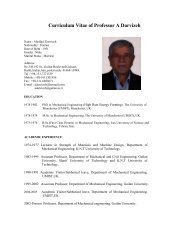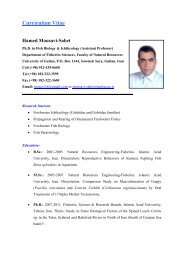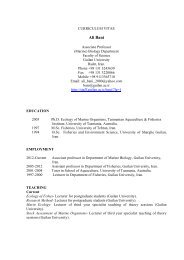Medical Tourism in Developing Countries
Medical Tourism in Developing Countries
Medical Tourism in Developing Countries
- No tags were found...
Create successful ePaper yourself
Turn your PDF publications into a flip-book with our unique Google optimized e-Paper software.
6 ● <strong>Medical</strong> <strong>Tourism</strong> <strong>in</strong> Develop<strong>in</strong>g <strong>Countries</strong>buy<strong>in</strong>g goods from all over the world; they have also been buy<strong>in</strong>g services.One of these is medical care at the po<strong>in</strong>t of production. In other words,they travel <strong>in</strong> order to consume the service at the po<strong>in</strong>t of sale. In medicaltourism, it is the doctor and the hospital that are be<strong>in</strong>g outsourced. As withtangible products, outsourc<strong>in</strong>g occurs because of price and availabilityconsiderations.Third, as a result of the <strong>in</strong>ternationalization of health-care providers <strong>in</strong>the more developed countries, medical staff at all levels, from the highlyspecialized bra<strong>in</strong> surgeon to the unskilled hospital janitor, come from develop<strong>in</strong>gcountries. Whether they tra<strong>in</strong>ed <strong>in</strong> the more developed countries andthen opted to stay, or whether they tra<strong>in</strong>ed at home and then were attractedby lucrative employment opportunities, the fact is that an <strong>in</strong>creas<strong>in</strong>g numberof medical personnel are from develop<strong>in</strong>g countries. Indeed, thePhilipp<strong>in</strong>es exports 15,000 nurses a year, and it’s estimated that one <strong>in</strong> tenFilip<strong>in</strong>os now works abroad. 38 A study by Gupta, Goldar, and Mitra showedthat of the Indian doctors tra<strong>in</strong>ed abroad, only 48 percent returned, andthe rest rema<strong>in</strong>ed to work <strong>in</strong> the country of tra<strong>in</strong><strong>in</strong>g. 39 Moreover, one outof five doctors <strong>in</strong> the world is Indian. Under those conditions, Westernpatients are used to be<strong>in</strong>g treated by a doctor from Ch<strong>in</strong>a and by a nursefrom the Philipp<strong>in</strong>es. It is just one step further to buy health services <strong>in</strong> thecountry of the doctor who provides them at home.Fourth, market conditions for health care <strong>in</strong> the more developed countrieshave resulted <strong>in</strong> high demand for services. Part of that is due to demographics.It is estimated that the world’s population will grow to 9 billionby 2050, 40 and, as Warner noted, the potential number of those who willtravel abroad for health care is huge. 41 The baby boomers, some 80 millionof them just <strong>in</strong> the United States, are gett<strong>in</strong>g older but want<strong>in</strong>g to stayyoung. They are an active generation, play<strong>in</strong>g sports well <strong>in</strong>to old age. 42 Inthe early twenty-first century, there is an <strong>in</strong>creas<strong>in</strong>g <strong>in</strong>terest <strong>in</strong> be<strong>in</strong>g healthyand <strong>in</strong> lead<strong>in</strong>g healthy lifestyles. As Henderson said, “This is notableamongst the baby boomer generation who are also exposed to strong pressures<strong>in</strong> modern society to conform to idealized images of bodily perfectionand resist the signs of age<strong>in</strong>g.” 43 As a result, baby boomers account for 60percent of the spa market. 44 And they are not alone. Older people are justas will<strong>in</strong>g to spend money on health and wellness. In OECD countries thereare currently more than 100 million people over 65, and that number isexpected to reach 200 million by 2030. At that time, it is expected that atleast half of all health expenditures will be on their behalf, and some of thesepeople may f<strong>in</strong>d it beneficial to receive care <strong>in</strong> a cheaper dest<strong>in</strong>ation. 45The above four po<strong>in</strong>ts <strong>in</strong>dicate why we should not be surprised thatmedical tourism is boom<strong>in</strong>g <strong>in</strong> less developed countries, but they don’t
















